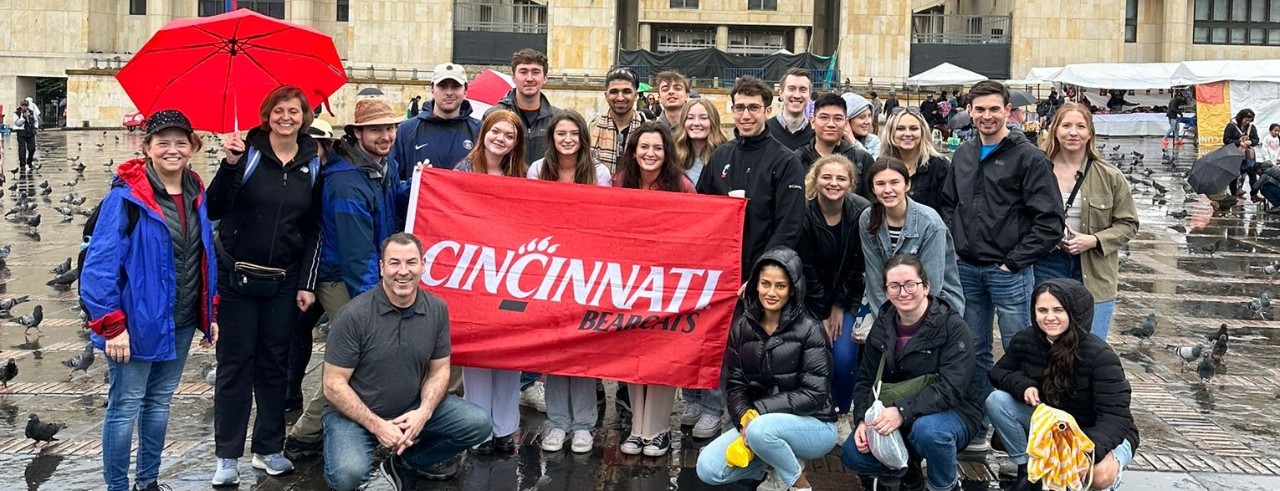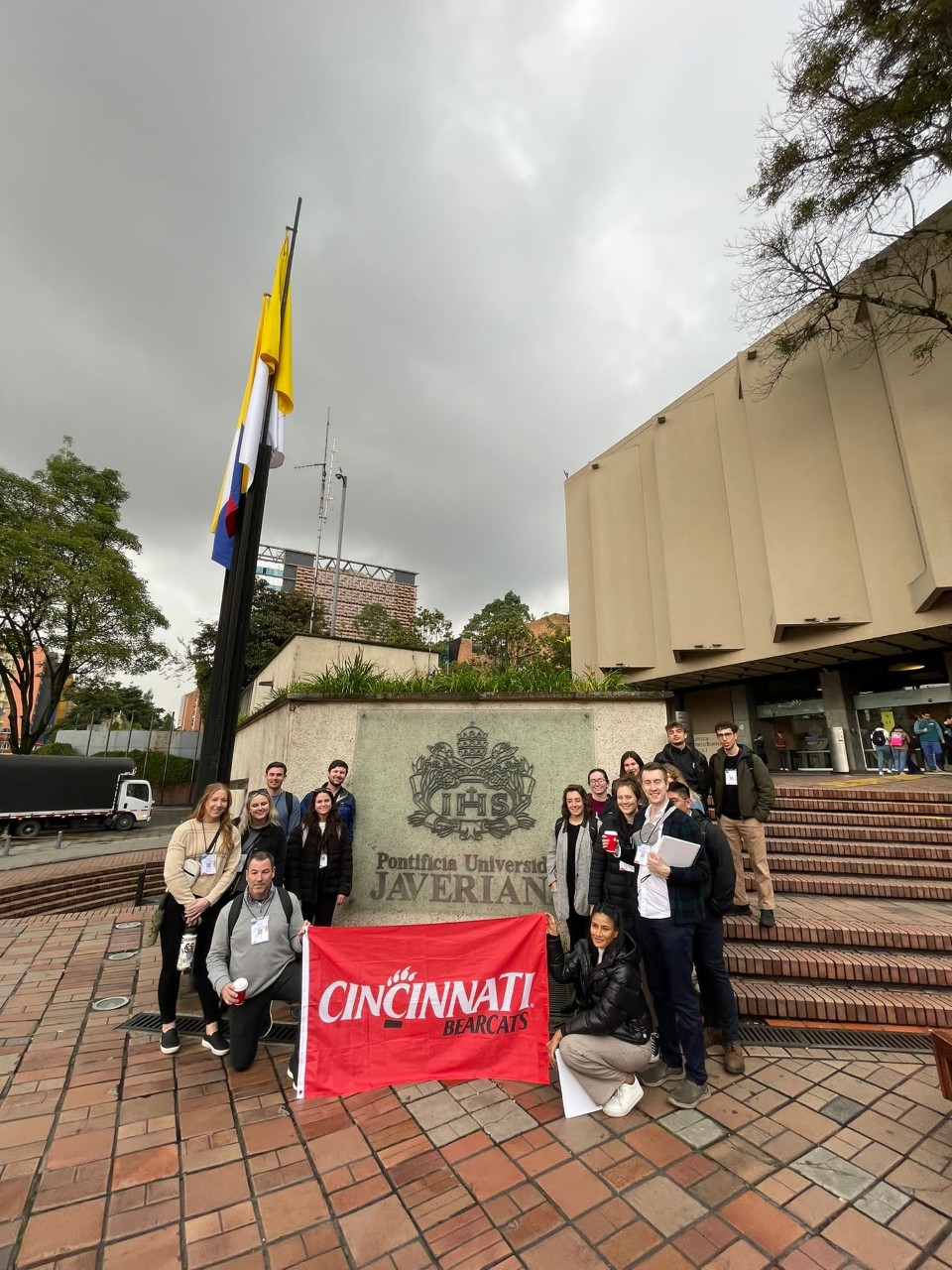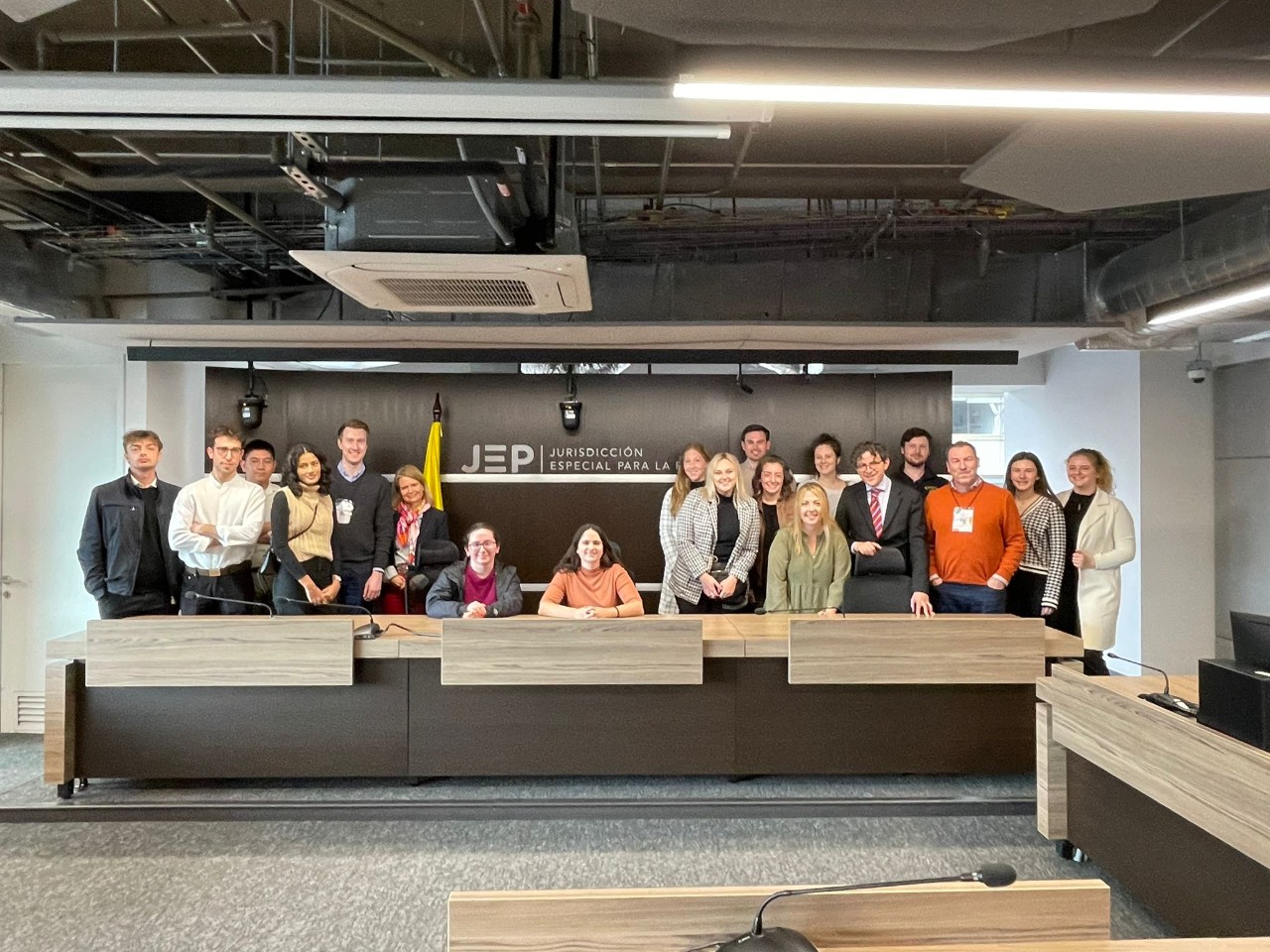
UC Law students set course for Colombia
The first College of Law faculty-led study abroad program travels to Bogotá
In a first-of-its-kind program, students in the College of Law traveled to Bogotá, Colombia during spring break as part of a short course exploring international trade, human rights and transitional justice.
The tour was originally planned for March 2020 but cancelled just three days prior to travel. Offered again this spring, the course still represents a major stride for the college, as short-term study abroad options are rare in law schools.
International collaborations are nothing new for UC Law, which is currently celebrating the 10th anniversary of the Master of Laws (LLM) program, a postgraduate degree program designed for internationally trained lawyers to gain experience with the U.S. legal system.
“The LLM program has brought the world to UC Law,” explained Nora Burke Wagner, assistant dean for international and graduate programs and director of the LLM program. “Our LLM students are folded into nearly every aspect of the college. By being involved in all those activities, they are creating an international experience for our mostly American JD students.”
The LLM program has brought the world to UC Law.
Nora Burke Wagner UC College of Law
The study abroad opportunity was open to both JD and LLM students, integrating the programs still further and offering an immersive, global experience for all participants. And for Wagner and program lead Sean Mangan, professor of practice, co-director of the Corporate Law Center and director of the Entrepreneurship and Community Development Clinic, going to Colombia was an opportunity to continue strengthening connections for the College of Law on a global scale.
Colombian appeal

UC Law students visit strategic partner institution, Pontificia Universided Javeriana, in Colombia. Photo/provided by Sean Mangan.
In 2015, while visiting Latin American institutions to promote the LLM program, Wagner found a collaborative partner in Ildikó Szegedy-Maszák, professor of economic law at Pontificia Universidad Javeriana.
From that relationship grew the first dual-degree program with the LLM. Javeriana’s law students study at UC in the fifth year of their bachelor of laws program to earn the LLM as well as their undergraduate degree. UC Law has since developed a dual degree program with the University of Trento in Italy and the collaboration with Javeriana has expanded into an institution-wide strategic partnership for UC.
Wagner and Mangan secured a study abroad development grant from UC International in 2018 to explore the possibility of creating a faculty-led program built on the relationship with Javeriana. Through the experience, law students would be exposed to broader global topics and examine another law system up close.
After the original course’s last-minute cancellation, the professors had two years to develop further relationships with Javeriana faculty and secure additional grant funding from UC’s Women in Law alumnae organization. All the extra prep work made for an even better program, explained Wagner.
“We continued to network with counterparts in Bogotá, at the university and in the legal community. We have almost 10 graduates of the double degree who are in Bogotá,” said Wagner. “There were new opportunities that we could pull into the week based on all that networking.”
Cross examination
The students hit the ground running in Colombia. Upon arrival, the group had two days to explore city sights and meet their counterparts from Javeriana over dinner.
Over the next week, they heard from a variety of lecturers enlisted by Szegedy-Maszák for their expertise in topics such as green energy, the Colombian economy and human rights.
Together, the students from both countries also put their knowledge to the test in a negotiations exercise designed by Mangan. The UC students were posed as an American startup company, with the Javeriana students acting as potential foreign investors. With a short fact sheet between them, the two groups negotiated a contract to get the best deal for each side.
“The students had to comprehend the scenario, develop a rapport, advance their client’s objectives, and reduce their conversations to an enforceable agreement, all across language and cultural differences and in a very limited amount of time,” explained Mangan. “You can always tell a good exercise by the volume in the room, and the enthusiasm and effort from the students far exceeded my expectations.”

UC College of Law students explore Bogota, Colombia during their study abroad excursion. Photo/Miranda Weslake.
Second-year JD student Chelsea Szilagyi agreed that the simulation compressed semesters’ worth of business law into a nuanced view of multinational negotiations.
“It gives you a better perspective on business law,” said Szilagyi. “Not just business law from the American point of view, but a more global point of view of conducting businesses and negotiating contracts.”
“There’s learning that happens when you compare one system to another system,” added Wagner. “By comparing and contrasting, you actually get a better understanding.”
The UC students also enjoyed socializing with their Colombian peers inside and outside of the classroom. Andrea Costa, an LLM student from Italy, noted that the Javeriana students made him feel at home and were “more similar to Italians than American students.”
“I feel more enriched on the human side, too,” explained Costa. “Meeting Colombian students and comparing different and similar aspects of studying… opened my view on the world we live in—on everything—and I don't remember myself before meeting all these people.”
Balance of justice

Law students get an inside tour of the Special Jurisdiction for Peace. Photo/provided by Sean Mangan.
In one of the most impactful parts of the itinerary, the UC group visited the Special Jurisdiction for Peace (acronym JEP in Spanish), an alternative court system designed to adjudicate decades of armed conflict within Colombia through a transitional justice process. Set up as part of a peace agreement between the Colombian government and a major guerrilla group, FARC, JEP examines crimes and human rights violations holistically to provide future stability and peace for the nation.
Transitional justice organizations like JEP deal with incredibly complex cases, wrestling with some of the world’s toughest arguments and heart-wrenching scenarios. As a result, not everyone is convinced of its efficacy.
“Transitional justice is not something everyone's a fan of, and each side has valid reasons for not liking it,” said Szilagyi. “Going on the site visit really brought to life a topic that I had only had experience with academically and I got some real-world perspective.”
Andrea Sriskandarajah, a second-year JD student, immediately drew parallels between Colombia and her family’s roots in Sri Lanka, which has also experienced civil war. But she especially admired the Colombian government’s effort to recognize its past rather than devolving into “historical amnesia.”
“History always creeps into even modern-day case law,” explained Sriskandarajah. “It’s very easy to point fingers at other countries and think they don't know what they're doing. It turns out every country is just trying to figure things out.”
The JEP tour weighed on the students’ minds for the rest of the trip, providing material for thought-provoking discourse and debate. For Mangan, the visit offered the students a once-in-a-lifetime window into a groundbreaking initiative in its infancy.
“JEP is perhaps the most watched transitional justice initiative in the world, and our visit was emotionally powerful,” noted Mangan. “Seeing the law in action, led by some incredibly courageous Colombian attorneys, was an unforgettable experience.”
Final verdict
The study abroad course ultimately set a precedent for future faculty-led study abroad in the College of Law. The only decision now is how often travel goes on the docket.
“So far, the response to offering this opportunity has been so positive that I can't imagine we wouldn't do it again,” said Wagner. “We absolutely think it's essential to connect students to opportunities that will help them develop the competencies needed to excel in the global legal marketplace.”
Although not all of the students may ever work in fields they studied in Colombia, they agreed that the experience provided real-world value for their future careers.
“The world is increasingly globalizing, and so, if you understand law from a different perspective and a different point of view, you're going to be a much better lawyer,” said Szilagyi. “Being more familiar with the world itself will help you gain better perspective, rather than only being exposed to the American mindset, the American rule of thumb and the American way of doing it.”
Sriskandarajah added, “There's more value in study abroad besides adding value to your law degree. It makes people better people, because you can't be ethnocentric. It makes you a more personable person and builds cultural competency. We can always use a lot of that.”
Featured image: College of Law students stand outside the Special Jurisdiction for Peace in Colombia. Photo/provided by Sean Mangan.
UC the World
Prepare yourself for a global future. Whatever your program or passion, UC offers study abroad and international work experiences that will take you where you want to go. Explore the possibilities.
Related Stories
UC Answers: Why is giving back so important?
February 17, 2021
Francesca Gottardi has served countless hours with the Urban Morgan Institute for Human Rights at the University of Cincinnati College of Law, including in Georgia where she fought for women's rights.
A UC first: Enrollment tops 48,000
August 18, 2022
The University of Cincinnati anticipates record enrollment as classes begin Monday, Aug. 22, with a projected 48,300 students — a 3% increase over last year. It will mark nearly a decade of continuous growth of a student body that increasingly reflects the university’s core values.
Cincinnati Decision Day arrives with record numbers and Bearcat surprises
February 5, 2021
As UC reaches Cincinnati Decision Day on Feb. 5 — when thousands of students find out if they’ve been admitted to the university to pursue their studies — the numbers reveal that the institution is more popular than ever.
